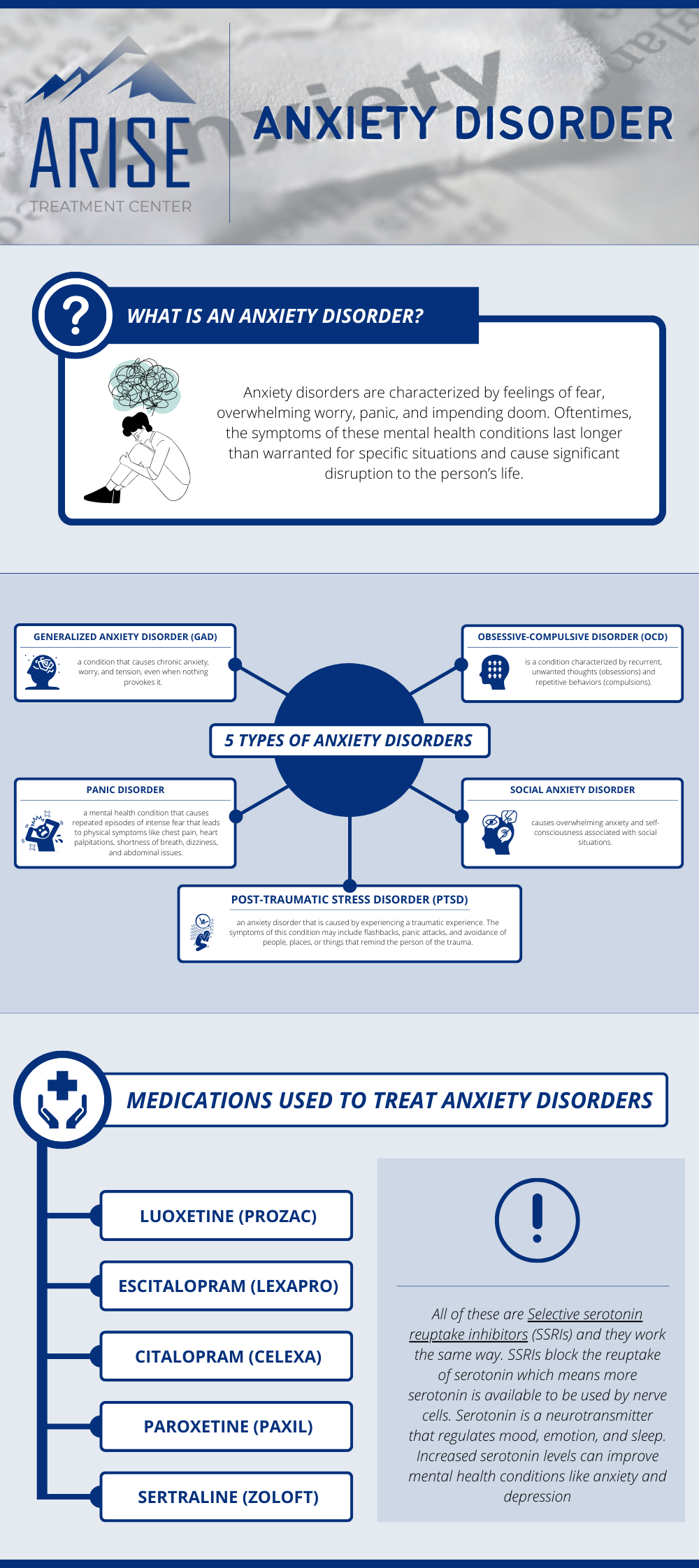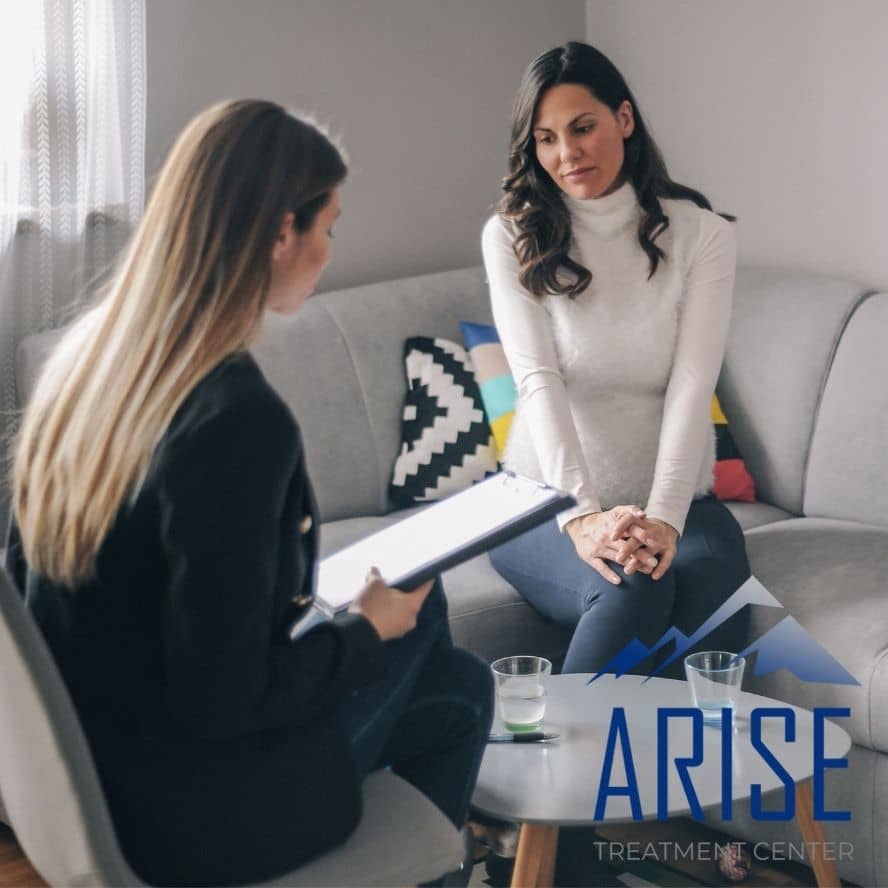Everyone experiences anxiety from time to time. In many cases, feeling anxious is a normal response to danger or fear. For example, being in a situation that makes someone feel uncomfortable could cause some stress and worry – this is a completely normal response.
However, some individuals experience anxiety daily. People who suffer from daily anxiety are most likely dealing with some form of anxiety disorder. There are many different types of anxiety conditions, with each one causing significant disruption to an individual’s daily life.
Oftentimes, people who struggle with anxiety also suffer from a co-occurring substance use disorder. This happens as they attempt to self-medicate their emotions with drugs or alcohol. When someone suffers from both an anxiety disorder and addiction, they must find a dual diagnosis treatment center to receive help for both conditions at the same time.

What is an Anxiety Disorder?
Anxiety disorders are characterized by feelings of fear, overwhelming worry, panic, and impending doom. Oftentimes, the symptoms of these mental health conditions last longer than warranted for specific situations and cause significant disruption to the person’s life.
According to the U.S. Department of Health and Human Services, the 5 main types of anxiety disorders include:[1]
- Generalized Anxiety Disorder (GAD) – a condition that causes chronic anxiety, worry, and tension, even when nothing provokes it.
- Obsessive-Compulsive Disorder (OCD) – is a condition characterized by recurrent, unwanted thoughts (obsessions) and repetitive behaviors (compulsions).
- Panic Disorder – a mental health condition that causes repeated episodes of intense fear that leads to physical symptoms like chest pain, heart palpitations, shortness of breath, dizziness, and abdominal issues.
- Post-Traumatic Stress Disorder (PTSD) – an anxiety disorder that is caused by experiencing a traumatic experience. The symptoms of this condition may include flashbacks, panic attacks, and avoidance of people, places, or things that remind the person of the trauma.
- Social Anxiety Disorder – causes overwhelming anxiety and self-consciousness associated with social situations.
According to the National Alliance on Mental Illness, “Over 40 million adults in the U.S. (19.1%) have an anxiety disorder.”[2]
Anxiety disorders are some of the most common mental health conditions to affect people living in America. Unfortunately, studies have found that 20% of individuals with an anxiety disorder also suffer from addiction, proving that this co-occurrence is extremely common.[3]
How are Anxiety and Addiction Connected?
Anxiety and addiction often co-occur as a result of self-medicating. Individuals who have anxiety disorders have a hard time coping with their daily lives due to the constant worry and fear they experience and many people with anxiety suffer from low-self esteem. Many of the medications used to treat anxiety, such as benzodiazepines, can also be habit-forming, increasing the risk of a co-occurring substance use disorder.
Some individuals begin abusing drugs or alcohol to cope with feelings of fear, low self-esteem, and panic. Oftentimes, people with anxiety abuse substances that give them confidence, like alcohol, benzodiazepines, or marijuana. This gives them a false sense of confidence that allows them to function at the moment.
Abusing substances may provide temporary relief, but it will cause the symptoms of anxiety to worsen over time. So while the person experiences lessened symptoms at the moment, their feelings of anxiety will worsen when they are not using the drugs or alcohol.
Some people experience substance-induced anxiety. This typically occurs in people who abuse alcohol, stimulants, or medications intended to treat anxiety like benzodiazepines. Once the individual is not under the influence, their anxiety comes back ten-fold, causing the cycle of addiction to begin.
Dual Diagnosis Treatment for Anxiety and Addiction
When someone suffers from comorbid anxiety and addiction, they must attend a dual diagnosis treatment program. These programs combine traditional addiction treatment methods with mental health recovery services. Without treating both conditions simultaneously, the symptoms of the untreated condition will cause a relapse in the other.
Dual diagnosis treatment programs for anxiety and addiction in California rely heavily on behavioral therapy. After a patient is effectively detoxed off of substances, they will begin attending individual and group therapy sessions that help them learn to manage the symptoms of both their anxiety disorder and substance use disorder.
Common types of therapy used to treat anxiety and addiction include:
- Cognitive-behavioral therapy (CBT)
- Dialectical behavior therapy (DBT)
- Traditional talk therapy
- Interpersonal therapy (IPT)
- Psychodynamic psychotherapy
- Exposure therapy
- Eye movement desensitization and reprocessing (EMDR)
- Motivational interviewing (MI)
Additionally, some people may have treatment-resistant symptoms associated with their anxiety disorder. In this case, the patient may benefit from non-narcotic anxiety medications like SSRIs or SNRIs. Both of these medications work by increasing the amount of serotonin in the brain to help individuals feel better overall.
Medications commonly used to treat anxiety disorders include:
- Fluoxetine (Prozac)
- Escitalopram (Lexapro)
- Citalopram (Celexa)
- Paroxetine (Paxil)
- Sertraline (Zoloft)
It is important to note that not everyone who suffers from anxiety requires medication. In many cases, medications are used as a short-term solution for unmanageable symptoms while the patient is undergoing therapy. Once they learn to naturally manage their anxiety, the medication can be stopped.
Finding Help for Anxiety and Addiction in California
Anxiety and addiction can be difficult to overcome, but treatment can help. The integrative care provided by dual diagnosis rehab centers can help you learn to manage the symptoms of your anxiety and recover from addiction.
Contact Arise Treatment Center today for more information on our Southern California dual diagnosis treatment program.
References:

